In this article:
The occurrence of pimples on the skin is a problem faced by many people, commonly in their teenage years. These inflamed, red bumps form due to blockage and infection in the oil glands in the hair follicles.
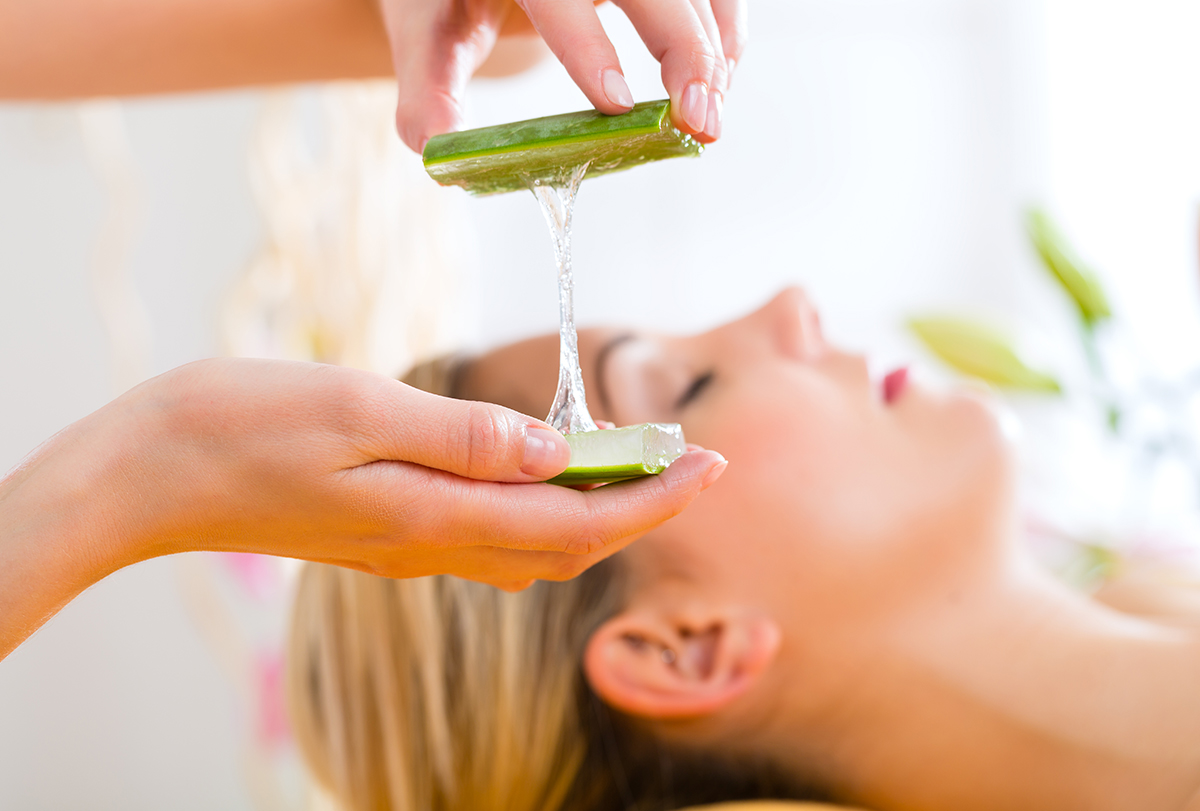
The pimples may either be papular, which are mild and without pus, or pustular, characterized by the formation of pus due to the action of white blood cells.
While severe cases of pimples require medical attention, mild cases can be treated at home with self-care and home remedies.
Home Remedies to Treat Pimples
The following home remedies can help in the treatment and management of pimples.
Disclaimer: It is important to patch test the remedies on the underside of your arms to rule out any adverse skin reactions such as burns and rashes. If irritation occurs, avoid their use.
Needless to say, people who are allergic to any of the ingredients in the remedies should not use them. Those who have sensitive skin are advised to take special precautions before trying out any topical remedy.
1. Apply a honey mask
Honey is widely used for acne treatment due to its high sugar and antioxidant content that exhibits antimicrobial and anti-inflammatory properties. (1)(2)
It is best to use raw, organic, or medical-grade honey as spot treatment or to make a face mask with other antibacterial ingredients such as turmeric and cinnamon. (3)
How to use:
- Wash your face with a mild cleanser or scrub.
- Mix 1 tsp of cinnamon or turmeric with 2 tbsp honey, and apply the mixture to your face.
- Wash the mask after 15–20 minutes.
2. Use turmeric
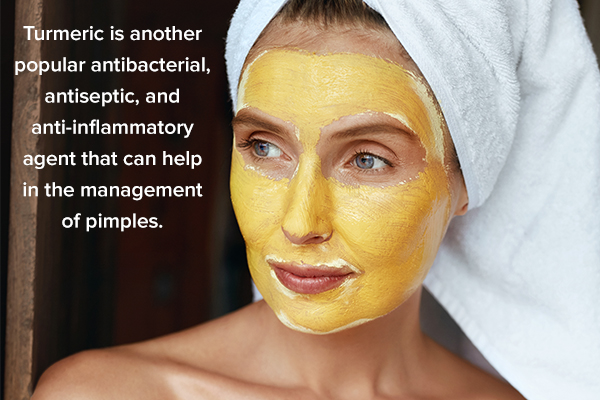
Turmeric is another popular antibacterial, antiseptic, (4) and anti-inflammatory agent (5) that can help in the management of pimples.
Since pimples result from inflammation due to bacterial infection, the anti-inflammatory nature of curcumin, the active ingredient of turmeric, can help reduce the severity of pimples.
How to use:
- Mix 1 tbsp of turmeric with water, honey, or lemon juice to form a thick paste. Use this paste on the affected areas and allow to dry for a few minutes before washing it off with tap water. Repeat this remedy twice a day for a week.
- Consume turmeric milk daily at bedtime to help accelerate skin repair and pimple healing.
3. Use neem topically
Neem possesses antiseptic, antifungal, antibacterial, and anti-inflammatory properties. (6) It also acts as an astringent that can help remove excess sebum from the skin, preventing the formation of pimples. It can even dry out existing pimples.
How to use:
- Grind a few neem leaves to form a paste and mix in ½ tsp of turmeric powder. Apply the paste to the affected area and rinse with lukewarm water after 20 minutes.
- Boil neem leaves in water to form an antiseptic solution, and use it to wash your face.
4. Apply aloe vera gel
Aloe vera gel is efficacious in the treatment of mild to moderate acne, owing to its anti-inflammatory and antibacterial nature. (7)(8)
How to use:
Extract some fresh aloe vera gel and apply it to the skin directly. Rinse after 15–20 minutes. You can also buy commercially prepared aloe vera gel products.
5. Use essential oils for spot treatment
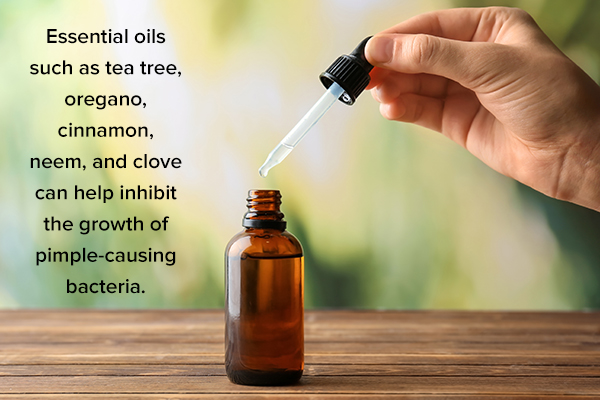
Essential oils such as tea tree, (9) oregano, (10) cinnamon, neem, and clove oils can help inhibit the growth of pimple-causing bacteria.
It is important to dilute these oils with carrier oils such as coconut, olive, or castor oil before use to avoid irritation. You can also use jojoba oil as a carrier oil, as it enjoys anecdotal evidence for the treatment of acne and pimples.
How to use:
Mix 1–2 drops of any essential oil with 4–5 drops of carrier oil, and apply the oil blend to your pimples directly.
6. Dab some witch hazel
Witch hazel is an astringent that can help dry out acne pustules, remove excess oil from the skin, and even control inflammation. (11) Moreover, witch hazel can also aid skin repair, thus helping fade the pimple scars.
How to use:
Soak a cotton ball with a few drops of witch hazel, and dab it on the affected areas.
7. Try apple cider vinegar
The use of apple cider vinegar (ACV) for the treatment of pimples is based on anecdotal evidence and is not supported by any scientific study. ACV is thought to help by regulating the acidic pH of the skin, controlling bacterial growth, and clearing cell debris off the skin surface.
How to use:
Dilute ACV with water in a 1:3 ratio, and dab it on the affected areas using a cotton ball. You can also use lemon juice in place of ACV.
8. Consider OTC products
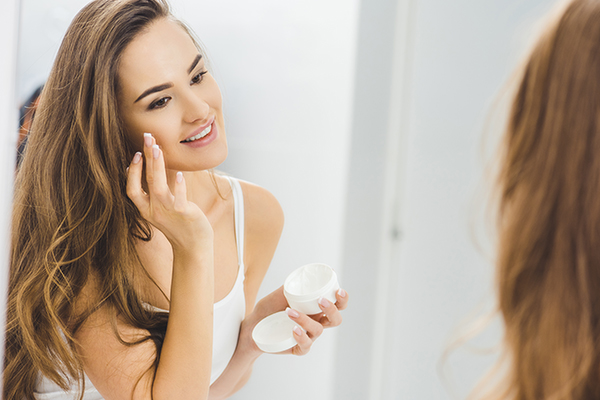
Aside from the aforementioned natural ingredients, you can also use several over-the-counter medications for the treatment of pimples, including:
- Acne cleansers
- Vitamin A or retinoid creams
- Topical creams containing azelaic acid, benzoyl peroxide, salicylic acid, or 3% hydrogen peroxide (12)
- Resveratrol creams – Although red wine and grapes are natural sources of resveratrol, they are not as effective for acne treatment (13)(14)
- Green tea extract-based creams, especially those containing epigallocatechin-3-gallate (15)(16)
Self-Care to Manage Pimples
Along with medical or at-home treatment, it is vital to observe some self-care measures for effective pimple management, including the following:
- Cleanse your skin. Cleanse your skin using a mild cleanser or nondrying soap and lukewarm water twice a day. You can also use benzoyl or salicylic acid to help control oil production. Also, make sure to remove all makeup before sleeping.
- Steam. Steaming your face can help remove bacteria, oil, and dirt from your pores, thus allowing your skin to breathe.
- Apply a cold compress. Applying ice to the face helps improve blood circulation, reduces inflammation, and helps manage the pain caused by pimples. Moreover, freezing the clogged pores helps in effectively cleansing the skin.
- Avoid touching your face. Touching your face repeatedly can spread the infection and increase the chances of recurrence.
- Do not pick your pimples. Scratching, picking, rubbing, squeezing, or popping your pimples increases the risks of scars and delays healing.
- Protect your skin from the sun. Since acne treatment medications make your skin prone to skin burn, it is advised to use sunscreens before stepping outside.
Preventive Measures
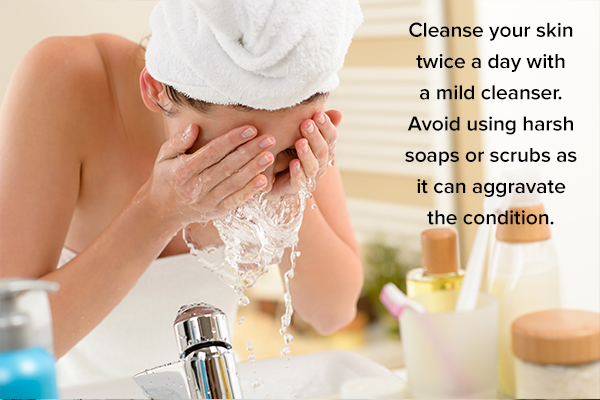
While pimples cannot be completely avoided during puberty or in the case of endocrine disorders, the following preventive measures can help reduce pimple breakouts and recurrence:
- Keep your skin clean. Cleanse your skin twice a day with a mild cleanser. Avoid using harsh soaps or scrubs as it can aggravate the condition. Rinse your face with water every time you exercise or sweat to prevent clogging of pores. Clean off makeup every night to allow your skin to breathe.
- Use non-acnegenic skin products. Choose only noncomedogenic and non-acnegenic lotions, creams, and makeup products.
- Avoid hair sprays. If you use hair sprays or styling gels, take care to avoid contact with your skin.
- Manage your hair. Keep your hair out of your face and wash it daily if it is oily.
- Do not use harsh products. Avoid the use of alcohol-based products, toners, or astringents on your skin as they can dry out the skin, often resulting in increased sebum release.
- Keep your makeup tools clean.
- Wear loose clothes. If you develop acne on your back or chest, avoid wearing tight clothes.
- Exfoliate. Use a gentle scrub to exfoliate your skin weekly. You can prepare oatmeal, cocoa, or yogurt scrubs at home to prevent the buildup of dead skin cells and oil inside the pores.
Most-Asked Questions About Pimples
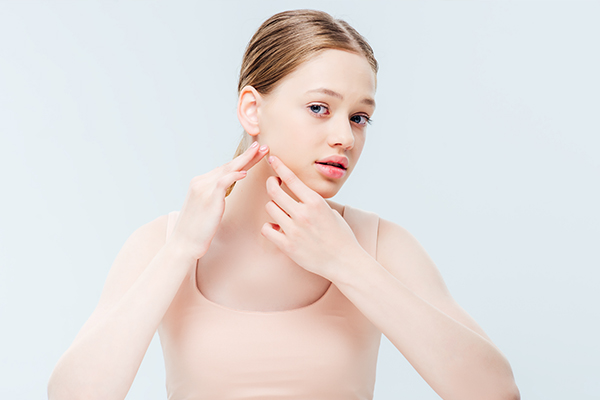
Can dietary changes help in pimple management?
It is a common misconception that the intake of milk, chocolate, high-fat, or sweetened foods results in the formation of pimples. This reaction varies from individual to individual.
If you find that a food group, such as dairy or high glycemic foods, exacerbates your condition, it is best to avoid it. (17) However, certain foods such as zinc, (18) fish oil, (19) and vitamins C and A (20) may help in acne management. You can include beans, oysters, whole grains, nuts, lobster, and crabs in your diet to increase your zinc intake.
Consume more of freshwater fishes, chia seeds, flaxseeds, and plant oils as fish oil sources. Vitamin A can be found in squash, broccoli, carrot, liver, and cantaloupe, while citrus fruits are good sources of vitamin C.
Can stress lead to a pimple breakout?
While stress is not directly associated with the formation of pimples, stress management can help in the treatment of acne. (21) However, some medications for stress or depression may have a side effect of pimple formation.
Can baking soda help in the treatment of pimples?
Baking soda is popularly advertised as a home remedy for acne management, but its use has no scientific support. Baking soda does have antibacterial properties, but it is only effective against gram-negative bacteria. Acne-causing bacteria are gram positive.
Can toothpaste help in acne management?
The use of toothpaste as a spot treatment for acne is a commonly discussed anecdotal remedy. However, there is neither any scientific study to support the use of toothpaste as an acne treatment, nor is it recommended by doctors.
Instead, you can try various other home remedies mentioned above, which have been shown to be effective in acne and pimple management.
Final Word
Acne, caused by blockage in the sebaceous glands, is a common skin problem. Its most common symptom is pimple formation, which can commonly be seen during puberty and other hormonal conditions.
Pimples can be easily managed by implementing self-care measures and following home remedies. It is vital to take care of pimples in the early stages to avoid complications such as scars and cysts.

- Was this article helpful?
- YES, THANKS!NOT REALLY


